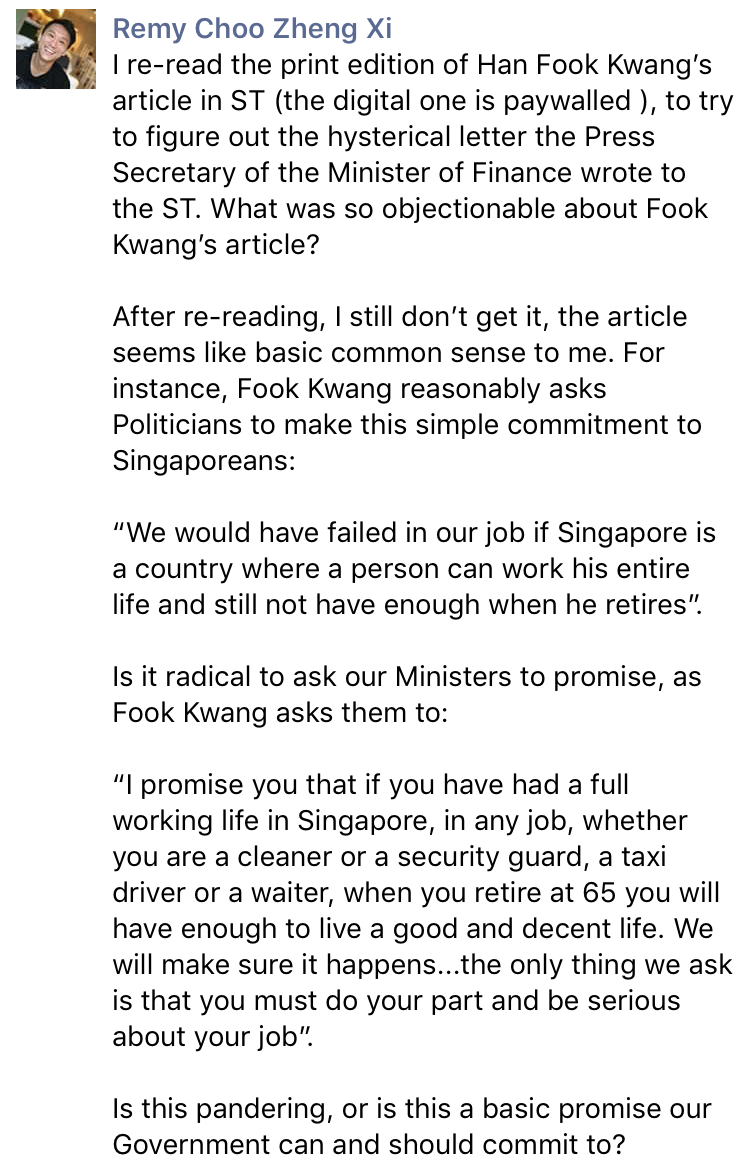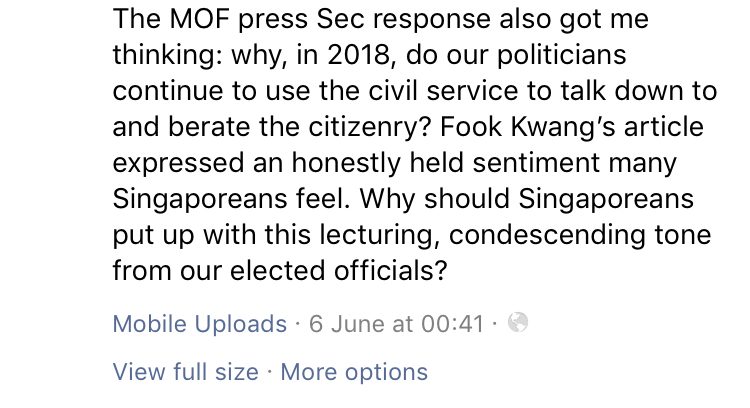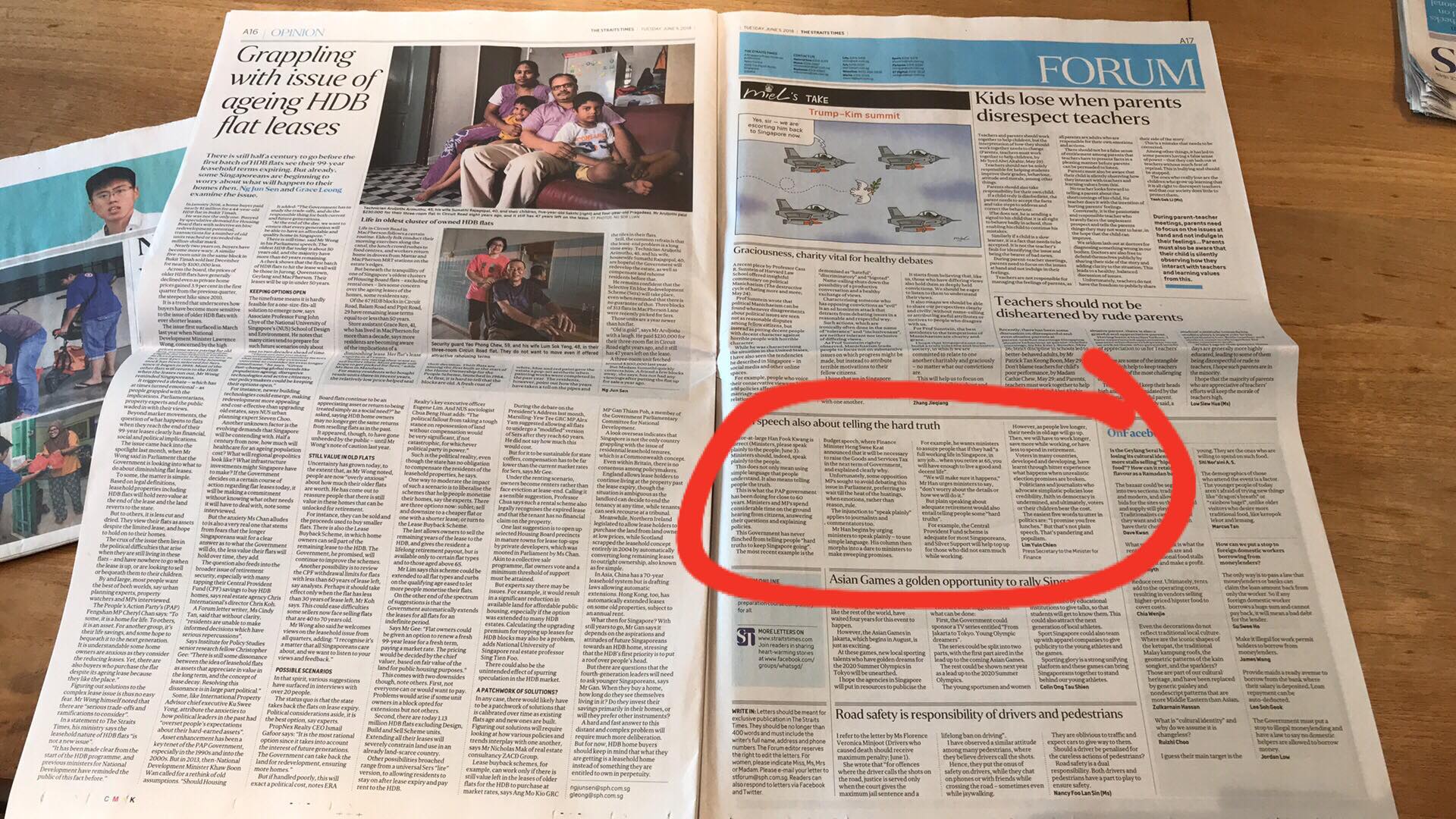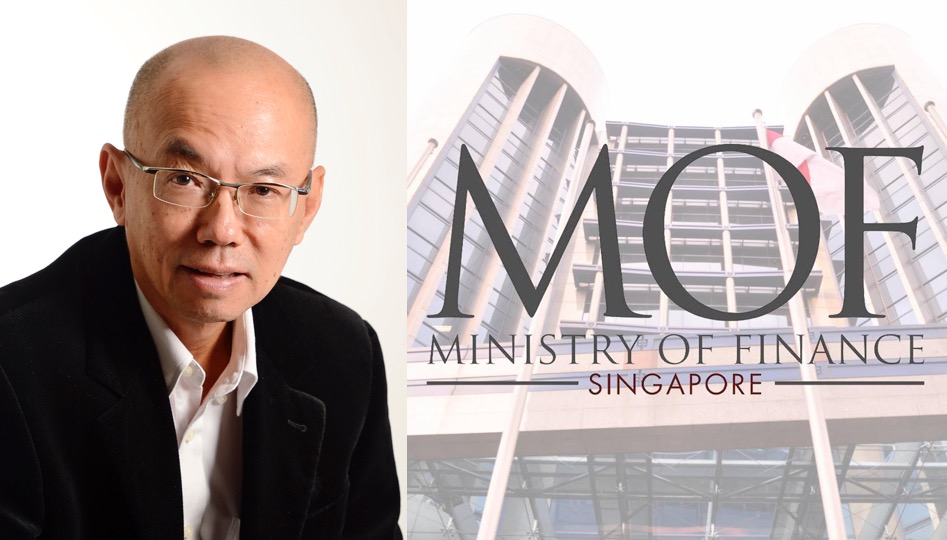In case you missed it, Straits Times Editor-at-Large Han Fook Kwang wrote a commentary last Sunday (Jun 3), asking for ministers to speak plainly.
He said that the parliament speeches that discussed the government's agenda were filled with abstract stuff - the economy, elites, income divide. Such topics had to contend with events such as the Malaysian general election, Trump-Kim Summit, making the speeches easy to miss for the man on the street.
Han urged the political leaders to picture "a real person in front of you, a typical Singaporean with real problems trying to cope with making ends meet," adding that this typical Singaporean must believe that the ministers understand his anxieties before he could listen to plans that will make his life better.
He also called for the government to make a "simple promise" to Singaporeans that so long as they have had a "full working life" that they will have enough to live a "good and decent life" when they retire at 65.
This was swiftly met with a response two days later (Jun 5) from the Press Secretary to Finance Minister Heng Swee Keat, who called Han out for "pandering and populism".
Writing for Heng or in his own capacity?
The letter of rebuttal by Lim Yuin Chien was a curious one.
It is common for press secretaries to write to the papers for policy-related matters. But what caught people's attention were some of the things written by Lim.
First, it was the specific mention of the "PAP" Government:
"Ministers should, indeed, speak plainly to the people.
This does not only mean using simple language that people understand. It also means telling people the truth.
This is what the PAP government has been doing for close to 60 years. Ministers and MPs spend considerable time on the ground hearing from citizens, answering their questions and explaining policies. (emphasis ours)"
Then Lim brought in the The Workers' Party (WP) and commented on their actions in Parliament:
"The most recent example is the Budget speech, where Finance Minister Heng Swee Keat announced that it will be necessary to raise the Goods and Services Tax in the next term of Government, and explained clearly why.
Unfortunately, some opposition MPs sought to avoid debating this issue in Parliament, preferring to wait till the heat of the hustings, when emotions, rather than reason, rule. (emphasis ours)"
The perceived political nature of Lim's response to Han is somewhat surprising.
Why? This is because press secretaries in Singapore are civil servants. Many Singaporeans have the impression that press secretaries do not usually mention PAP or WP in their replies to the public.
This is a situation unlike the press secretaries in the United States and United Kingdom, where press secretaries are political appointments.
A short segue on press secretaries and how they function in other democracies
In the United Kingdom, both the director of communications and the press secretary are political appointments. Political advisers -- which means they are from the same political party as the Prime Minister -- have in the past acted in a press secretary role.
In the United States, both the roles of the White House Press Secretary and the White House Communications Director are given to a senior public relations staff member of the winning Presidential candidate's campaign team. The White House Communications Director is either the deputy campaign manager or the campaign communications director.
The White House Press Secretary acts as the spokesperson for the executive branch of the United States government administration, especially with regard to the President, senior executives, and policies.
[related_story]
Reactions to Lim's reply
Former PAP MP Inderjit Singh is one of the more prominent observers so far who has weighed in on the issue, agreeing that "the responses from the government unfortunately does not reflect humility".
He added that there is the mindset from the government that the "silent majority don't feel the same".
Hence, Inderjit urged "more people to speak up sincerely", so everyone knows what the real issues Singaporeans are concerned with.
The Online Citizen (TOC) editor Terry Xu asked if Lim was writing in his own capacity or on behalf of the Finance Minister.
Xu questioned if it was appropriate for civil servants to "defend the ruling party".
Chinese blog Red Ants pointed out that Han's commentary was, to his mind, clearly about plain-speaking and not about pandering and populism. The writer wondered if regular Singaporeans were not sharp enough and were missing out on something within Han's commentary that the press secretary was able to pick up on.Lawyer Choo Zheng Xi said Lim's letter was hysterical and that Han's commentary was not pandering. He also said this:
"The MOF press Sec response also got me thinking: why, in 2018, do our politicians continue to use the civil service to talk down to and berate the citizenry? Fook Kwang’s article expressed an honestly held sentiment many Singaporeans feel. Why should Singaporeans put up with this lecturing, condescending tone from our elected officials?"
Here's his full post:

 Screenshot from Remy Choo Zheng Xi's Facebook post
Screenshot from Remy Choo Zheng Xi's Facebook post
Ex-editor of now defunct The Middle Ground Bertha Henson wrote a blog post — There's no humility nor respect — and called Lim's letter a "blistering lecture". She too did not see Han's commentary as "a call to pandering and populism" and had sharp words for Lim's letter:
"The 4G leaders seem to be seeing shadows everywhere. They are coming across as prickly and thin-skinned."
In a postscript rounding off her blog post, she said she had made the assumption that it was Heng making the comments in Lim's letter, rather than Lim penning the letter of his own volition, because she did not think Lim "would have written the piece without his (Finance Minister Heng Swee Keat) go-ahead."
A neutral civil service? A fine balance needed
TOC's Xu asked "Is it appropriate for civil servants to be writing letters to defend the ruling party and does Mr Lim's letter actually blur the line between civil servants and political appointees?"
Perhaps one perspective, offered by Ex-Ambassador-at-Large Bilahari Kausikan, can offer some answers.
In his fifth lecture as the Institute of Policy Studies' 2015/16 S R Nathan Fellow for the Study of Singapore on how Singapore can cope in an ambiguous world, Bilahari had this to say about civil service neutrality:
"Still, where politicians go, the civil service must eventually follow.
The idea that the civil service is or ought to be politically neutral or independent is a myth. A "politically neutral" or independent civil service is to be found nowhere on earth. This is for the simple reason that the civil service is always and everywhere the instrument of the government in power.
The civil service has a responsibility to give its political masters objective advice. But that is not the same thing as being "politically neutral". The civil service is obliged to carry out the instructions of the government, irrespective of whether those instructions are in accordance with its advice.
I find it remarkable that so many people, even some civil servants, do not seem to understand the relationship of the civil service to the government. Perhaps they do not want to understand."
In 2016, Prime Minister Lee Hsien Loong also spoke about "politics and policies" at the Administrative Service dinner.
He told the senior civil servants that there "will always be a fine balance – between the civil service being neutral and non-political, and the civil service being politically sensitive and responsive".
In other words, the fine balance must be maintained because civil servants work with and for political leaders in a political environment.
More importantly, PM Lee highlighted that both political leaders and civil servants, particularly at senior levels, share the same fundamental values and goals that guide their thinking and motivate them to pull in the same direction.
Hence, it is interesting to observe whether future responses from press secretaries would continue to maintain the fine balance with the 4G leadership.
It's a pity Lim's letter did not receive wider attention online. ST published it online at 5am on Tuesday, Jun. 5, and did not share it on its Facebook page, which boasts more than a million followers. So only people who actively read ST would have come across the letter.
Even in print it was not exactly the most prominent. This is a picture of pages A16 and 17 of the paper's June 5 main section — buried in the lower half of its Forum page, no less:

¯\_(ツ)_/¯
(Editor's note: A previous version of this article did not clearly explain the role of the Press Secretary in Singapore and how the civil service works with the political leaders. We have included the additional facts accordingly.]
Here are some of the previous responses from the government to Han's writing:
Top images via RSIS website, MOF Facebook page
If you like what you read, follow us on Facebook, Instagram, Twitter and Telegram to get the latest updates.
